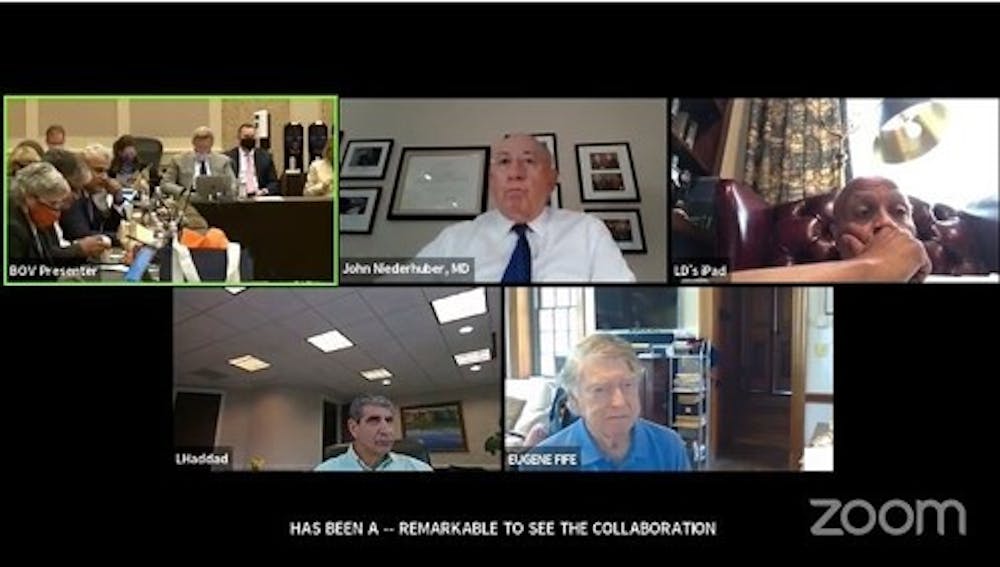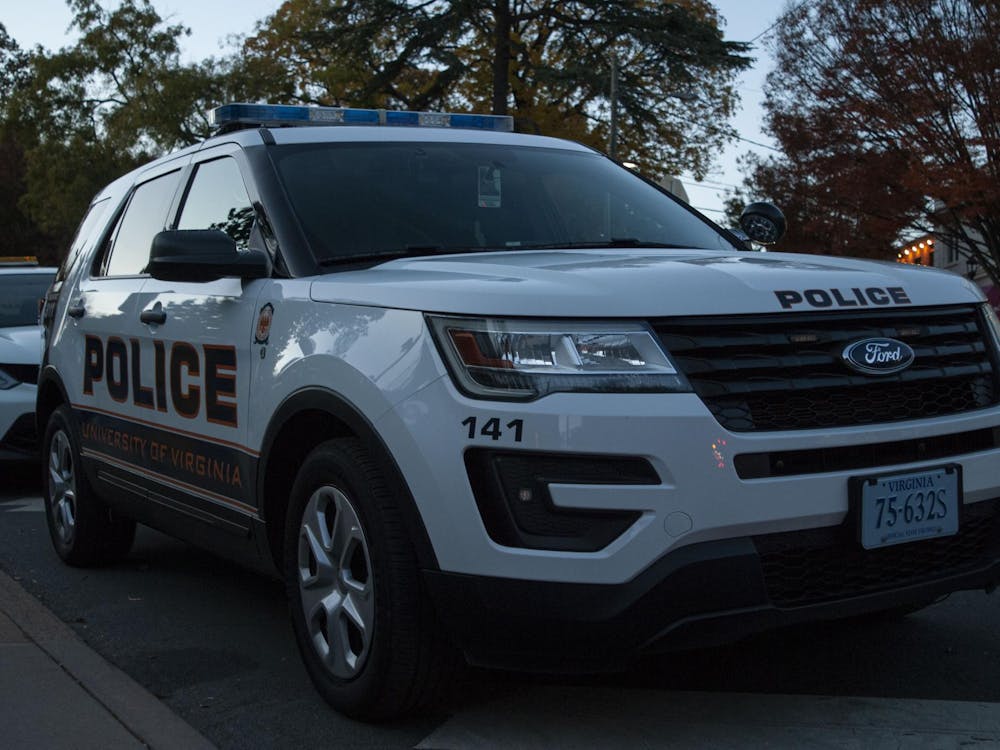The Health System Board of the Board of Visitors met Thursday afternoon to share the work done by U.Va. Health System and the School of Nursing during the COVID-19 pandemic — including providing free testing, PPE and other forms of support to disenfranchised members of the Charlottesville community. The open session was streamed live on YouTube and lasted 42 minutes.
Most of the Board was able to meet in-person, complying with social distancing guidelines and wearing masks. Dr. L.D. Britt, Chair of the Health System Board, as well as public members Eugene Fife and John Niederhuber and Buildings and Grounds Committee member Louis Haddad joined the meeting through Zoom.
After Britt opened the session by highlighting the significance of these challenging times, Dr. K. Craig Kent delivered opening remarks regarding the busy summer for U.Va. Health. The health system implemented several measures to mitigate the financial effects of COVID-19 and, after three months were finally able to secure the financials to provide better care for the community.
“We’re … busy again, caring for patients, our researchers are back to work and our students are engaged in learning,” Kent said. “We missed doing what we loved to do and we’re all back now and engaged and very thankful for that.”
Dr. Reid Adams, Chair of the Department of Surgery and Chief Medical Officer, provided updates on the contributions of U.Va. Health to the community.
U.Va. Health was the first site in Virginia to have in-house COVID tests and the first to open a COVID clinic. At the start of the pandemic, U.Va. Health put daily communications and PPE management in place to ensure that the community was well informed and had an adequate PPE supply for everyone. They were also able to rapidly convert to telehealth in order to provide greater patient care.
Adams mentioned that there are currently 25 to 30 COVID hospitalizations daily and expects that number to remain steady barring any spikes in cases.
Much of the report focused on U.Va. Health’s community testing program. The health system has partnered with 18 community organizations to offer accessible, free testing to provide early protection and prevent outbreaks especially among vulnerable populations such as Black and Brown communities within Charlottesville that have been disproportionately affected by the pandemic. 2,147 tests have been performed throughout the 20 events that have been held so far, of which 295 were positive — a 14 percent positivity rate.
In addition to testing, U.Va. Health has also worked with community organizations to provide support services such as PPE and food boxes, as well as dissemination of informational resources and handouts. These provide information about housing, voter registration, resilience and behavioral health support and what to do when you’re sick. Community partners include Blue Ridge Area Food Bank, Habitat for Humanity, Mt. Zion African Baptist Church, Buford Middle School, Westhaven Nursing Clinic and more.
“It’s efforts such as these that represent the essence of what it means to be an academic health system,” Adams said. “Innovation, novel care delivery, research, all that improve people’s lives and then publication in peer review journals so that others can learn, illustrates the best of what U.Va. Health has to offer.”
In response to a question by Niederhuber about the health system’s capacity for testing, Kent expressed that the community had a sufficient amount of testing and U.Va. Health was producing tests and developing partnerships with community organizations that have offered help.
“If there’s an increased need, I believe we have that capacity, so I’m very, very confident about our ability to take care of our community,” Kent said.
In terms of what hasn’t been working during the health system’s response to the pandemic, Adams acknowledged that there has been a huge boom in the need for care. Because of social distancing practices, it isn’t as efficient to see patients in clinics, and hospitals are full with sick patients.
“Those are all obviously stressful but manageable,” Adams said. “It’s what we do everyday, it’s what we like to do, and so I think it’s a much better alternative than not being busy.”
In the second part of the session, Dr. Pamela Cipriano, dean of the School of Nursing, highlighted the efforts of the School, desired outcomes, early progress and philanthropy. She emphasized the desire of the School of Nursing to have closer relationships across the health system and increase authentic collaboration between the School of Nursing and U.Va. Health so that they can have equal opportunities and a shared strategic mission.
Cipriano also talked about how, especially after the events of this summer, the School of Nursing has increased efforts to teach students and faculty to eliminate bias and racism. Other goals include amplifying LGBTQ+ content and learning how to have difficult conversations.
In terms of philanthropy, the School of Nursing is planning to use the $20 million donation from the Conway family to produce 1,000 more nurses over the next 10 years, increase RN to BSN enrollees, increase transfer admissions, expand simulation labs and offer more scholarships to decrease student debt in the nursing school.
Cipriano wrapped up her presentation with a statement about how many Nursing students have had to engage in face-to-face instruction. About 60 percent of graduate and undergraduate Nursing classes and about one-third of clinical nurse leader classes have an in-person clinical component.
“While we know that many other students will be doing much of their education online, our students are on the frontlines and very excited to be back,” Cipriano said.
The Board then entered a closed session to discuss business-related information regarding the operations of the Medical Center, School of Medicine and Transitional Care Hospital.
Riya Jain contributed to this article.







